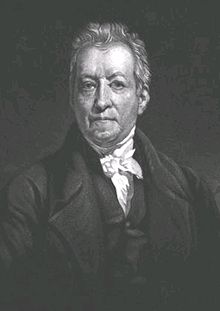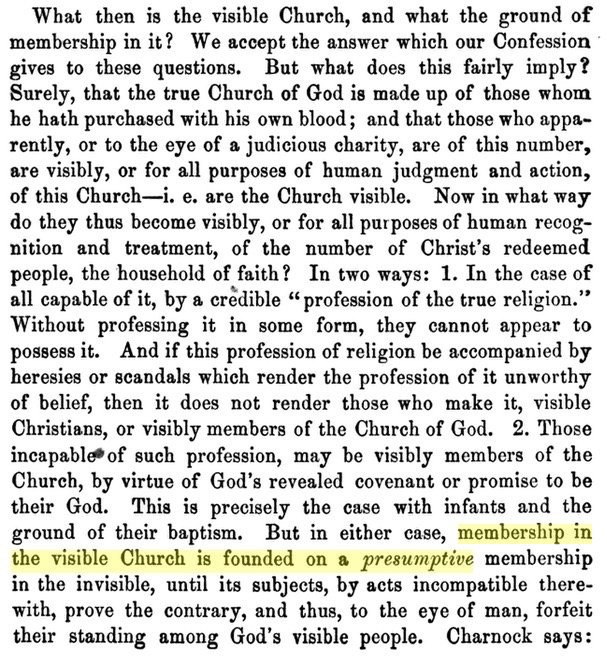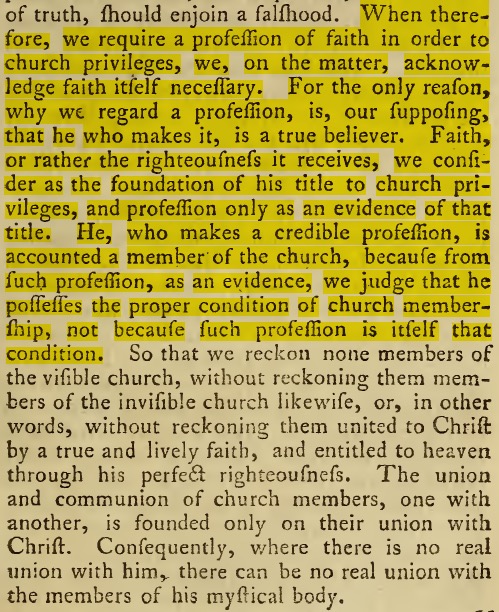commentary
Commentary on Hebrews (James Haldane)
 James Haldane (1768 – 1851) was converted later in life and entered the ministry as a Scottish Presbyterian. Upon further study, he and his brother (Robert) became baptists. Through their evangelistic efforts they planted many churches. Historian Nick Needham gives an overview of their lives here.
James Haldane (1768 – 1851) was converted later in life and entered the ministry as a Scottish Presbyterian. Upon further study, he and his brother (Robert) became baptists. Through their evangelistic efforts they planted many churches. Historian Nick Needham gives an overview of their lives here.
James was not shy about his baptist beliefs. In addition to writing “Reasons of a Change of Sentiment & Practice on the Subject of Baptism,” he wrote a commentary on Galatians (1848).
He also began writing a commentary on Hebrews, which was published posthumously from his manuscripts (1860). On Hebrews 8:6, Haldane explains
[T]he difference between [the New covenant] and the Sinai covenant is the grand object of the Epistle…Jesus is here described as the mediator of a better covenant. We are taught that the first covenant was ordained by angels in the hand of a mediator, Galatians 3:19, referring to Moses, who stood between God and the people Israel, went up to the mount with God, and received the instructions which he was pleased to deliver. But the Apostle is here speaking of the priesthood of Christ, and although Moses was the mediator of the Sinai covenant, yet when he was removed the high priest acted as mediator, for he presented the gifts and sacrifices which were enjoined, burned incense, and blessed them, and inquired of God upon any emergency which arose; but Jesus had obtained a more excellent ministry, being the mediator of a better covenant, established upon better promises.
The better promises of the new covenant are salvation from sin and eternal life. The promises of the Sinai covenant were all earthly, such as long life in the land of Canaan, plentiful harvests, victory over their enemies, and national prosperity. This may be ascertained by consulting Leviticus 26 :, Deuteronomy 28 :, and therefore that covenant was ratified with the blood of bulls and goats which can never take away sin, and only sanctifies to the purifying of the flesh. The new covenant, as has been already stated, is established upon better promises and was ratified with the blood of Christ, which cleanseth the children of the covenant from all sin. They shall all be presented faultless before the presence of God’s glory with exceeding joy.
On verse 8 he notes
The first covenant was made with Israel after the flesh, the seed of Abraham, Isaac, and Jacob; the new covenant is made with those that are Christ’s, who are Abraham’s seed and heirs according to the promise. Galatians 3:29. God adopted Israel after the flesh to be his peculiar people, in virtue of their being the seed of Abraham, and consequently related to Christ; but it was a carnal relation; hence Israel were blessed with all carnal blessings in earthly places, namely, the land flowing with milk and honey. But the true Israel, in virtue of their spiritual relation to Christ, are blessed with all spiritual blessings in heavenly places in Christ Jesus. Ephesians 1:3.
And verse 10
And I will be to them a God…—By the Sinai covenant God proclaimed Himself the God of Israel, and required their obedience; but they broke the covenant, by making the golden calf; and although the tables were renewed, still they were rebellious, and brought upon themselves many severe judgments; and not only Song of Solomon , but their rejection was foretold “Ye are not my people, and I will not be your God,” Hosea 1:9; and again, “The Lord God shall slay thee, and call his servants by another name.” But, amidst all their rebellions, there was a remnant according to the election of grace; and “as the new wine is found in the cluster, and one saith, Destroy it not, for a blessing is in it; so the Lord did for his servants” sakes, that he might not destroy them all” Isaiah 65:8. But when they filled up the measure of their iniquities, by not only killing the Lord Jesus, but rejecting the evidence of His resurrection and ascension, in the outpouring of the Spirit on the day of Pentecost, wrath came upon them to the uttermost. The Lord, according to His threatening, slew them, and called His servants by another name. Acts 11:26.
By the new covenant God is the God of His people, in a higher sense than He was to Israel after the flesh. The privileges which the children of both covenants enjoyed were in virtue of their relation to Christ. The one was a carnal relation; of them, according to the flesh, Christ came, and, in consequence, they were blessed with all carnal blessings in earthly places.
They were redeemed from Egyptian bondage; they were fed with manna, preserved in the wilderness, put in possession of a land flowing with milk and honey. Thus were they blessed with all carnal blessings in earthly places. The children of the new covenant are spiritually related to Christ, and are consequently blessed with all spiritual blessings in heavenly places. Their redemption is spiritual; their citizenship is in heaven; their inheritance is incorruptible, undefiled, and fadeth not away.
On verse 11, Haldane notes that Deuteronomy 30:1-6 was a prophecy of the new covenant.
Part of this chapter is quoted by the Apostle, who describes it as the language of the righteousness which is of faith, in contrast with the righteousness which is of the law. Romans 10:5; Romans 10:9. It is here the Apostle uses greater plainness of speech than Moses, who taught with a vail upon his face; but still he tells us that in the words quoted from Moses there is the language of the righteousness of faith, obscurely communicated by the Jewish lawgiver, but clearly taught under a more glorious dispensation. The account of the new covenant is taken by our Apostle from Jeremiah; but the same truth had been more darkly intimated by Moses, before Israel entered Canaan.
Commentary on Galatians (James Haldane)
 James Haldane (1768 – 1851) was converted later in life and entered the ministry as a Scottish Presbyterian. Upon further study, he and his brother became baptists. Through their evangelistic efforts they planted many churches in the area. Historian Nick Needham gives an overview of their lives here.
James Haldane (1768 – 1851) was converted later in life and entered the ministry as a Scottish Presbyterian. Upon further study, he and his brother became baptists. Through their evangelistic efforts they planted many churches in the area. Historian Nick Needham gives an overview of their lives here.
James was not shy about his baptist beliefs. In addition to writing “Reasons of a Change of Sentiment & Practice on the Subject of Baptism,” he also wrote a commentary on Galatians titled “An Exposition of the Epistle to the Galatians, Showing That the Present Divisions Among Christians Originate in Blending the Ordinances of the Old and New Covenants” (1848).
(He also began writing a commentary on Hebrews, which was published posthumously from his manuscripts).
Haldane says that each of the Abrahamic promises “received a literal and a spiritual fulfillment.” For example, he notes that the promise
that God would be a God to him and to his seed after him… had its fulfilment in the riches and prosperity of Abraham, and in Israel after the flesh, being brought into covenant with God; whereby he became their God, and acknowledged them as his peculiar people. Its spiritual fulfilment was, God becoming God of the true Israel, – Abraham’s children by faith, – by a better covenant, established upon better promises.
He warns
One great means by which Satan has succeeded in corrupting the Gospel has been the blending of the literal and spiritual fulfilment of these promises, – thus confounding the old and new covenants. The former was a type of the latter, and to this the Apostle refers, in speaking of the revelation of the mystery ‘which was kept secret since the world began, but now is made manifest, and by the Scriptures of the prophets, according to the commandment of the everlasting God, made known to all nations for the obedience of faith’ (Rom 6:26). The mystery here spoken of is, the hidden meaning of God’s dealings with the posterity of Abraham, to which, in his epistles, Paul frequently refers.




